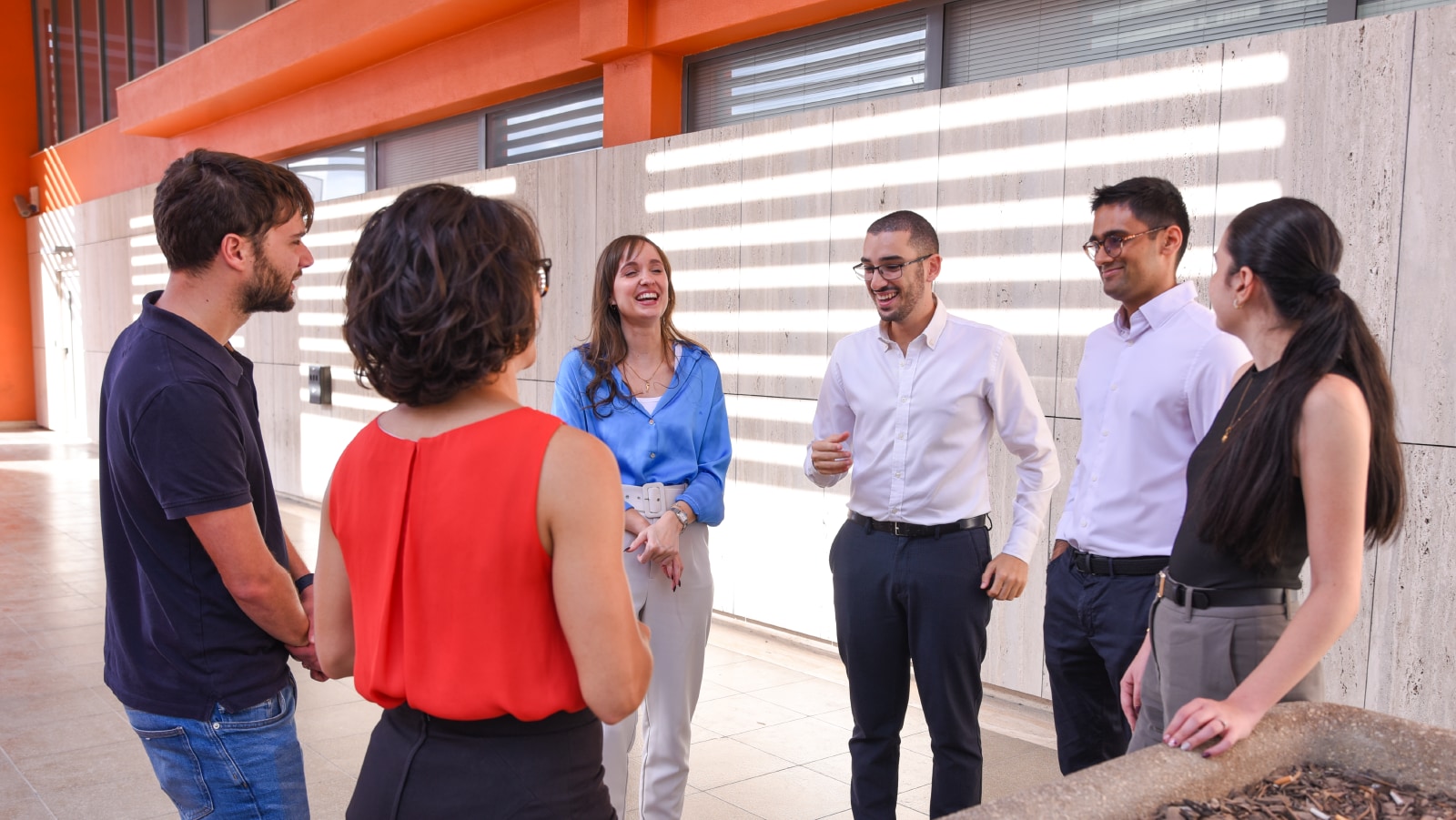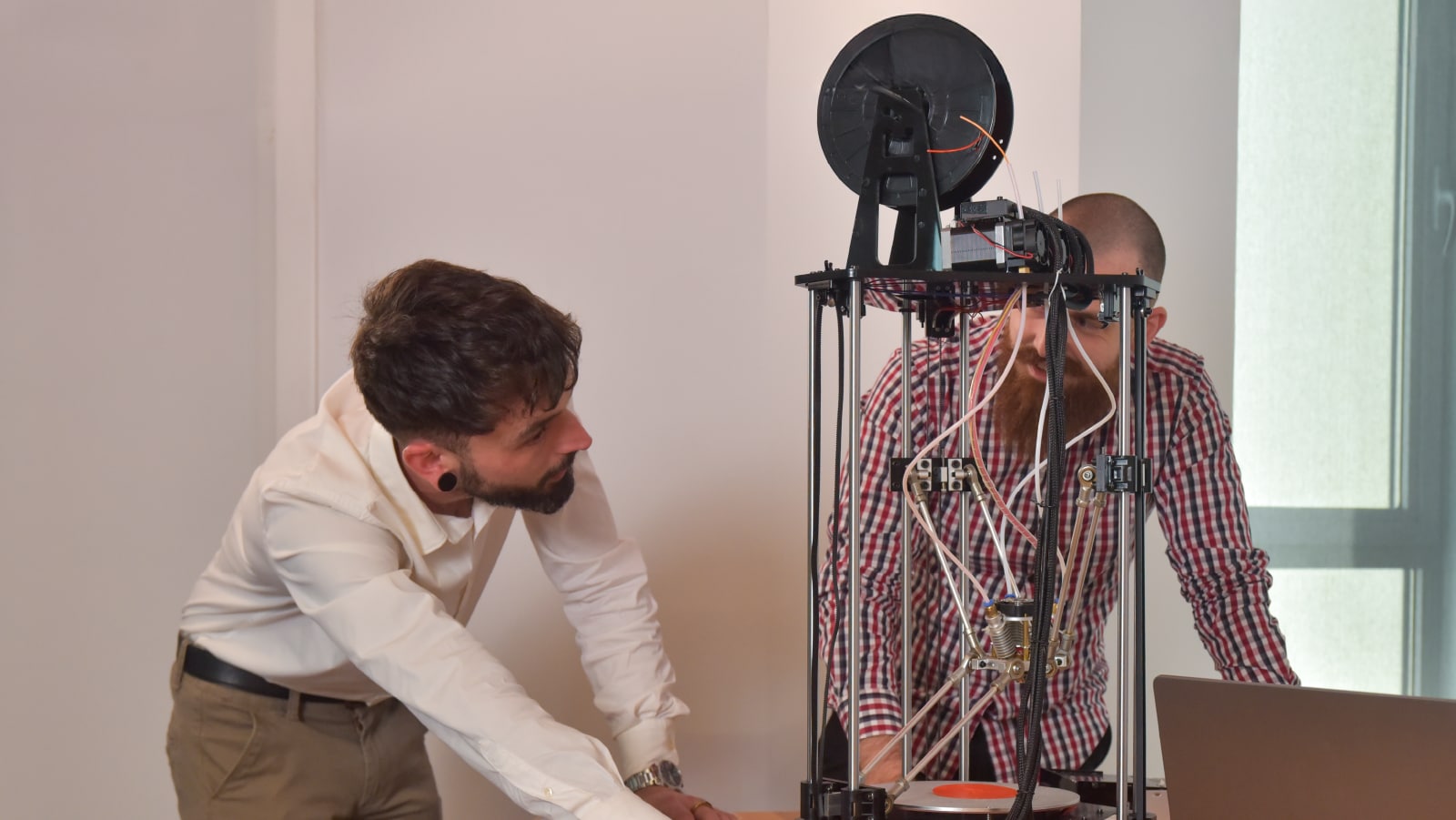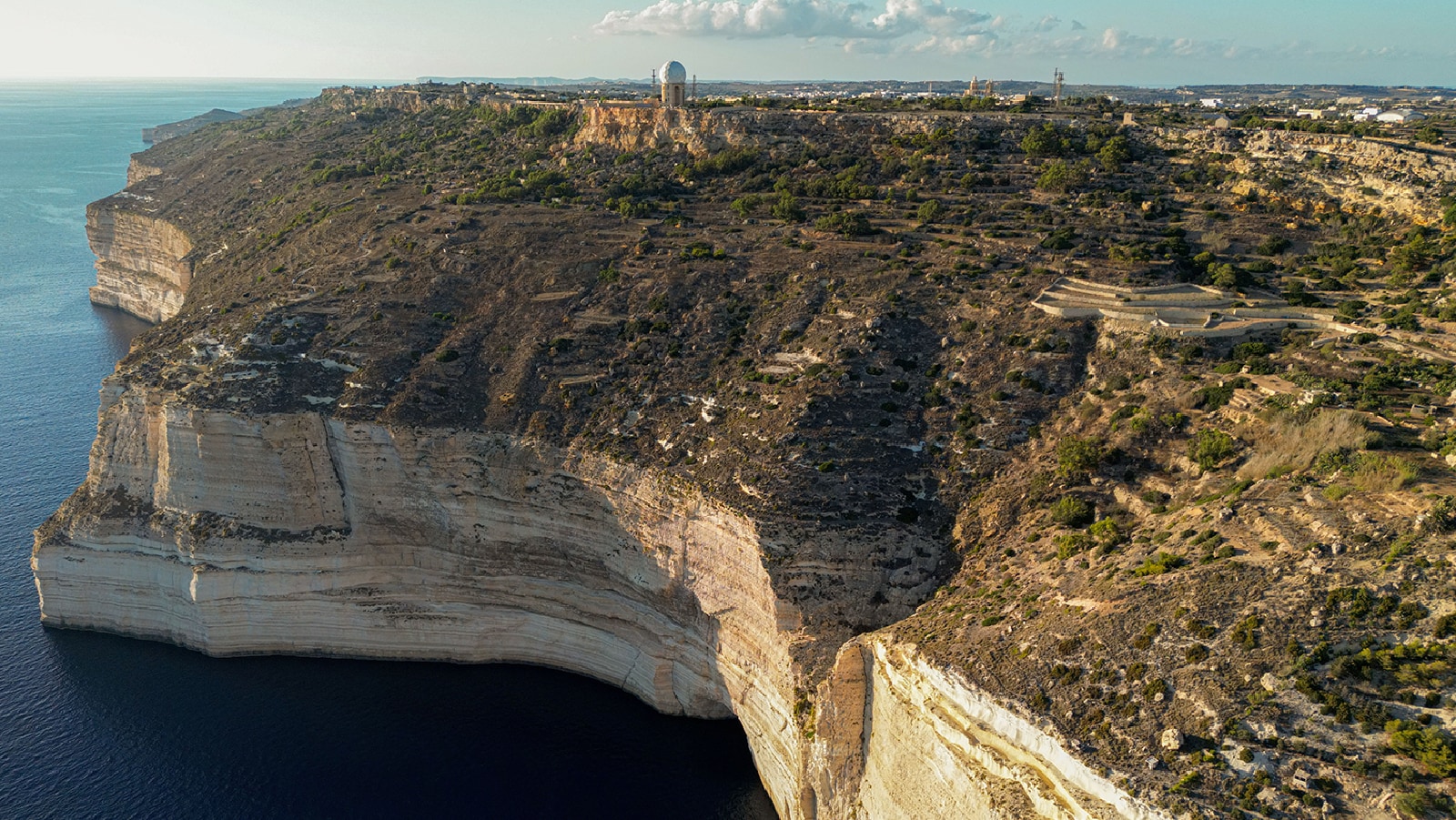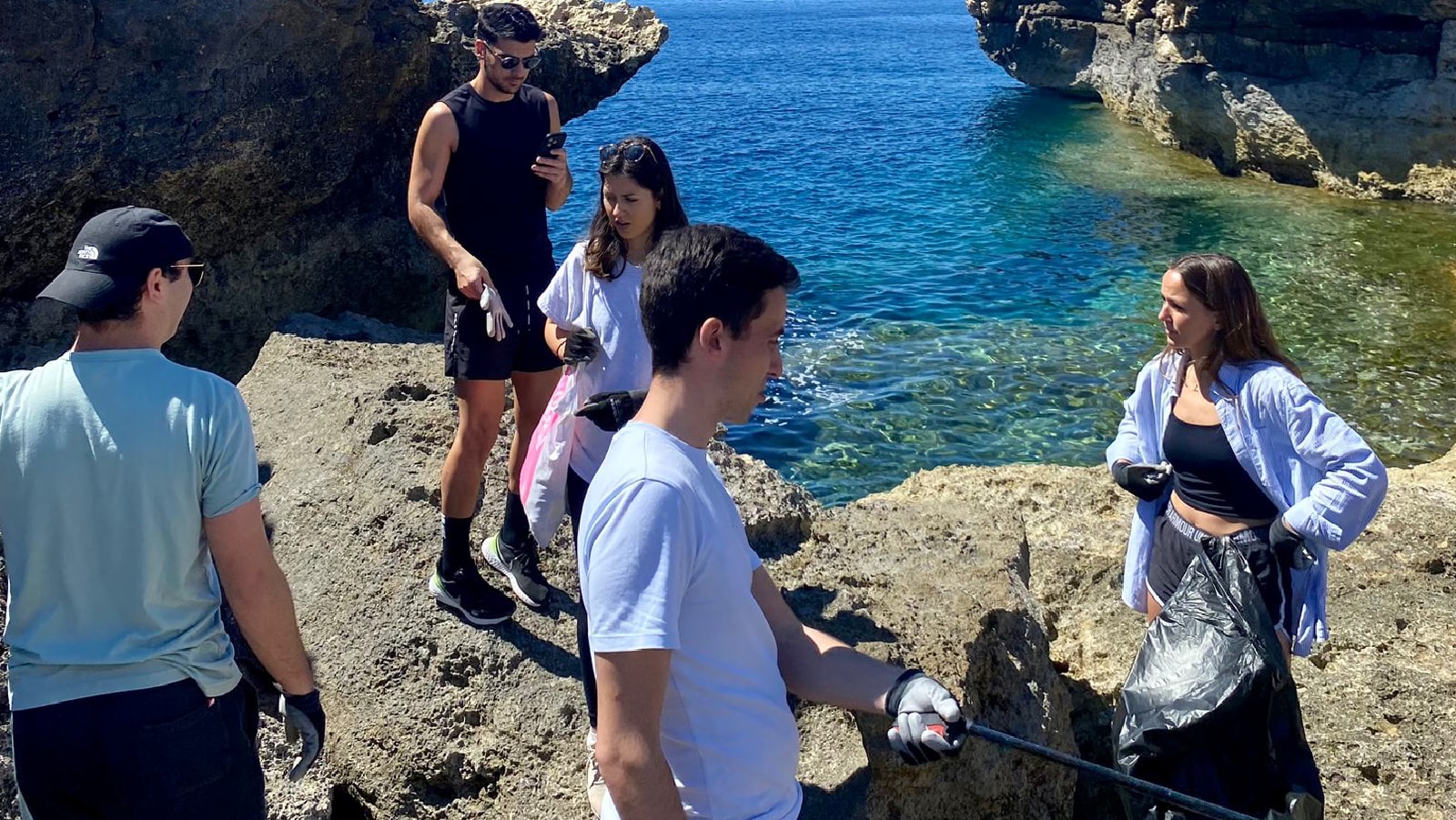Building a sustainable future
Temperatures are rising and the heat is on. Tackling climate change and its devastating impacts needs urgent action with the combined efforts of businesses, governments, and society alike. Here we outline how PwC Malta is executing its net zero strategy, and the progress and challenges we face along the way.
Despite Malta’s economic growth in recent years, significant challenges remain in terms of its environmental sustainability. The island is highly dependent on fossil fuels, and has one of the lowest proportions of energy consumption from renewable sources. Traffic congestion and emissions from road transport have persisted, along with a high reliance on private cars. Municipal waste per capita is among the highest in the EU, with most of this being landfilled. At the same time, biodiversity continues to decline as the extent of habitats in bad conservation status has dramatically increased.
At PwC Malta, we are focused on delivering solutions that drive value, fuel growth and contribute to strengthening our environment and society. This involves setting clear goals, creating actionable plans that achieve measurable results and collaborating with other organisations in the broader ecosystem to support our transition to net zero and advance towards a more equitable society.
Within this context, as a network we have pledged to achieve net zero greenhouse gas emissions, set near-term, science-based targets and regularly measure and report on our progress. To mitigate our impacts today, we are offsetting our emissions through high-quality carbon credits, transitioning to 100% carbon removal by FY30.
At PwC, our approach to sustainability is dynamic, working continuously to adapt to the changing market climate to deliver solutions that drive value and fuel growth, whilst strengthening our environment and societies. This means setting clear targets, creating actionable plans that achieve real results, and collaborating with other organisations in the broader ecosystem to support our net zero transition and bolster our progress towards a more equitable society.
In line with our purpose, we have made a worldwide commitment to achieve net zero greenhouse gas (GHG) emissions with near-term science-based targets set for 2030.
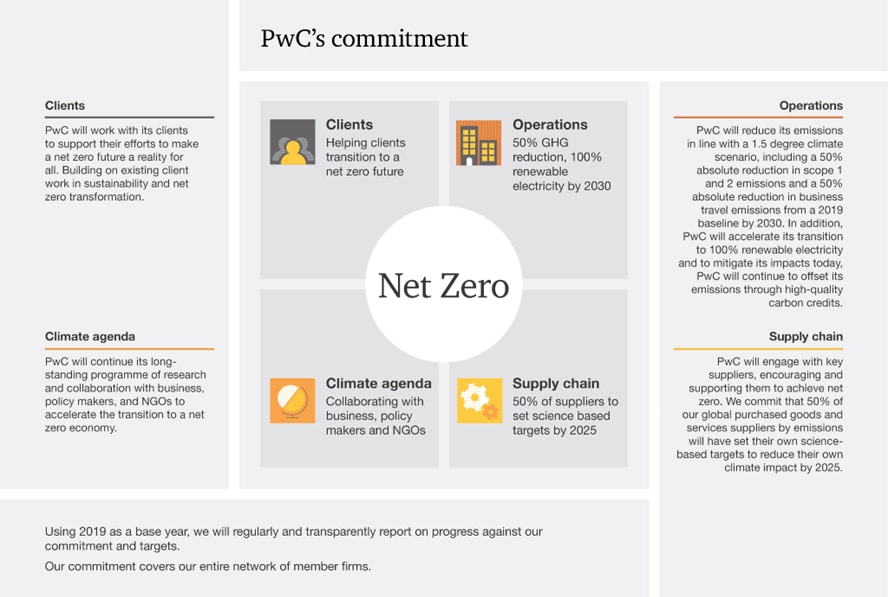
“The urgency of a net zero transition is clear, and it demands our collective action. At PwC, our mission is to not only lead by example but also empower our clients to navigate the intricacies of the path towards a more sustainable future. Working together, we can transform challenges into opportunities and pave the way for businesses to thrive without compromising the opportunities of tomorrow.”
PwC Malta’s Net Zero commitment
As PwC Malta, our commitment to reaching net zero remains strong. Over the past year, we advanced our local net zero plan by cutting, reducing, replacing, and offsetting our carbon emissions using high-quality carbon credits. By implementing a range of initiatives, we have already achieved a reduction in our scope 1, scope 2 and scope 3 business travel emissions of 14% compared to our baseline year (FY19).
We also understand that measuring and reporting our net zero progress is about more than just compliance; it serves to inspire our clients, employees, and other businesses. By being transparent about our journey, we aim to encourage local companies to embrace sustainable practices. Our strategy includes transforming our operations and supply chain, supporting clients on their low-carbon path, and actively engaging in climate policy discussions to help drive meaningful change.

Over the past year, our emissions profile has somewhat shifted. Following the acquisition of Megabyte, a local IT company, our carbon footprint has grown slightly. Our scope 2 emissions continue to represent a significant portion of our carbon footprint: accounting for around half of our total scope 1, scope 2 and scope 3 business travel emissions in FY23.
In line with PwC’s global commitment to reduce scope 1 and 2 absolute emissions by 50% from a 2019 base by 2030, we have continued to pursue mitigating initiatives to improve our environmental impact. In FY22, we invested in new HVAC systems with more energy-efficient heating and cooling equipment. Additionally, at the beginning of 2023, temperature limits were closely regulated on all air conditioning units to further optimise energy use.
The implementation of smart controls through a new building management system, besides other initiatives, have allowed us to better monitor and reduce unnecessary waste of electricity. The PV panels on the roof of our car park are fully operational, providing a continuous supply of renewable energy consumed entirely by our operations, thereby contributing positively to our net zero goals. Meanwhile, roof reinforcement and waterproofing works are underway on the main building to facilitate future PV installation and rainwater collection.
Due to our continued growth and expansion, we have acquired additional space within our building, resulting in an increase in occupied floor space and consequently higher electricity consumption. In parallel, the majority of our people have resumed working from the office, and we have welcomed a growing number of full-time employees, students, and interns as the firm continues to expand.
Despite this growth, our total scope 1 and scope 2 emissions in FY24 have decreased by 14% from our FY19 baseline.
______________________________________________________________________________________________________________________________________
Business travel emissions
Business travel is an essential part of how we operate and service our clients. It is also our largest source of (controlled) emissions, contributing to 48% of our total scope 1, scope 2 and scope 3 business travel emissions in FY24.
These emissions include not just air travel from business-related flights, but also land-based travel (rental cars, expensed fuel, taxis and trains) and overnight accommodation used during business travel. As an island state with no land connection to mainland Europe and significant overseas business, reducing our business travel emissions remains a challenge.
As a firm, we continuously analyse travel trends with a view to reducing emissions wherever possible. We recognise the unique challenges in lowering business travel emissions, particularly given Malta's reliance on air travel due to its island geography. Nevertheless, we remain committed to mitigating emissions that are difficult to reduce or eliminate, and are proactively managing our Scope 3 emissions by:
Travelling smarter: Optimising transportation modes when necessary, including choosing the most efficient air travel classes.
Travelling less: Engaging with clients early to plan trips more effectively, reducing the number of journeys, and identifying key project stages to decide between remote or in-person meetings. We also focus on using local resources and encouraging hybrid meetings where some participants attend in person and others remotely.
Despite increased business operations and ongoing overseas recruitment, we achieved a 5% reduction in business travel emissions from FY23, representing a decrease of 14% from our 2019 baseline.
Purchased goods and services emissions
Another aspect of our net zero journey concerns the purchased goods and services we source, with a focus on decarbonising our supply chain. We have plans to engage with key suppliers, encouraging and supporting them in their efforts to reach net zero, while also working to reduce emissions within our own operations. As a network, PwC has committed that 50% of our purchased goods and services suppliers by emissions will have set science-based targets to reduce their own climate impact.
Since most of our suppliers are local and maturity around ESG is still ramping up, selecting suppliers with validated SBTi remains a challenge. Consequently, in FY24, less than 10% of our purchased goods and services, based on greenhouse gas emissions, came from suppliers with established SBTs.
______________________________________________________________________________________________________________________________________
We recognise the importance of actively reducing the climate impact of our own operational footprint. That is why, to mitigate our impact today, we will continue to support high-quality independently verified carbon reduction and removal projects. By FY30, we will transition our carbon credit portfolio to 100% carbon removals, which demonstrates our commitment to reducing our environmental impact even as our business continues to grow.
We have taken proactive steps to offset energy and mobility emissions, spanning scope 1, 2 and 3 business travel. In this regard, the PwC network oversees a global carbon credit purchasing process for all member firms, including PwC Malta. This provides a variety of credits, covering a range of project types and locations. Notably, PwC Malta has secured an offsetting budget of 700 tonnes of CO2e for FY24 through EcoAct.
We have also partnered with Climeworks, a Direct Air Capture (DAC) facility in Iceland that helps combat global warming through carbon dioxide removal services. Climeworks' innovative technology aligns with PwC's New Equation strategy, which integrates human expertise with advanced technology for a balanced approach. Through this partnership, we aim to support the growth of crucial net zero technologies and solutions needed globally.
______________________________________________________________________________________________________________________________________
While net zero addresses our business’s impacts on the environment, the Task Force on Climate-related Financial Disclosures (TCFD) addresses how we are tackling the impacts of climate change on our business. Here, we recognise that our business may face climate change impacts on three distinct levels: direct, portfolio and the broader market. The assessment we have undertaken zeroes in on the direct impacts, focusing on the outcomes that directly affect PwC Malta’s operations, services or people.
While most climate hazards fall below the threshold for significant impact, drought stands out as both a current (2020) and future (2050) concern. We assessed our sensitivity to these hazards in terms of how they may impact key resources across various aspects, including our offices in Qormi, other PwC facilities, the security and safety of our staff, remote work capabilities, telecommunications and internet infrastructure, power supply, business travel and population migration and access to workforce, identifying which are the most relevant.
We noted that heat, precipitation, floods, high winds and wildfires would likely lead to the most disruption to our key business resources. However these have not been flagged as either current or expected impacts of concern.
As we move forward in our climate risk journey, our next steps involve evaluating the effectiveness of our current adaptation measures in addressing the impacts of the identified hazards. We will also proactively identify and develop plans for business responses needed to mitigate or adapt to the direct physical impacts identified. Finally, as we recognise the importance of collaboration, we will identify the stakeholders that we believe should be involved to actively engage them in our agenda.
______________________________________________________________________________________________________________________________________

Other initiatives
While our net zero ambition remains at the core of our action plan, we also pursue a number of initiatives to promote responsible business practices. Our mission is to set an example for others to follow, using our market influence to shape the attitudes of our clients and staff. This commitment goes beyond our net zero goals, encompassing community engagement, education and the promotion of a culture of sustainability across all levels of our business.
Throughout the year, we engaged with stakeholders in various ways to advance our sustainability agenda. We hosted events to educate on ESG and sustainability, collaborated with the Malta Chamber to promote sustainable business practices, and launched a dedicated ESG training programme. We organised update sessions to share knowledge on our targets, commitments, and challenges, emphasising the collective effort needed to achieve these goals.
In addition, our commitment to future leadership development is evident through PwC’s NextGen programme, designed to equip the next generation of leaders with the skills to tackle global challenges. By integrating ESG considerations into leadership discussions, we aim to establish a long-lasting foundation for responsible business practices and environmental stewardship.
Environmental volunteering is another cornerstone of our efforts. Through the Giving Back Initiative 2024, our team has contributed over 200 hours to activities like environmental cleanups, including the Cirkewwa Marine Park. We’ve also partnered with MOVE Malta for the PwC Step Challenge, with a tree to be planted for every 50 kilometres walked. This challenge resulted in over 70 million steps meaning that around 1,000 trees will be planted in future CSR activities.
Discover more about
Sustainability Services
Contact us













